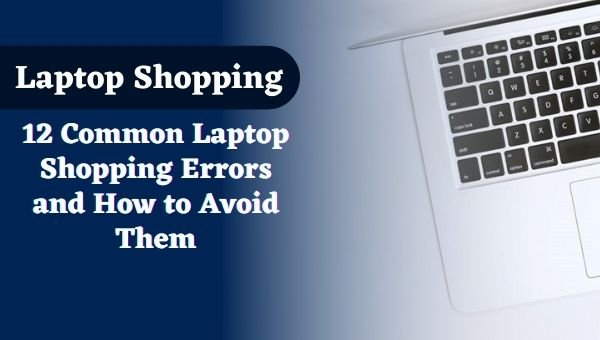Your old laptop was a workhorse that finally died a noble death, and now you’re without a computer. It happens to all of us, and the thought of shopping for new laptops can seem daunting and confusing.
Laptop shopping is quite easy if you know what you’re looking for. If you avoid some common laptop shopping errors, you should be able to find a suitable machine for you in no time.
The most important thing is personal preference and knowing what you want and need from your new computer. Here are some things to avoid when shopping for laptops.1. Choosing Design Over Function
We all have our favorite brands, and sometimes we feel strangely bound to buy from them and only them, with little actual knowledge of the functionality and specs of the laptop we’re looking to buy.
 You should always shop for your new laptop based on specs, not the branding and design. The design of the laptop is somewhat important, of course, but ultimately you want your laptop to be the best to use, not the best to look at.
You should always shop for your new laptop based on specs, not the branding and design. The design of the laptop is somewhat important, of course, but ultimately you want your laptop to be the best to use, not the best to look at.
Instead of focusing primarily on design, check out the screen resolution, the hardware inside the computer, and the refresh rate. These are the things that can really tell you about the quality of the product you’re buying.
2. Choosing Size Over Durability
If you’re looking to buy a laptop, it’s probably a fair assumption that you’re after something more lightweight and portable than a desktop computer.
That’s completely fair, but make sure that you’re not placing too much emphasis on the size and ignoring the machine’s durability. Smaller laptops are great for when you need to be working while on the go, but they can break a lot easier.
If you’re planning on using your laptop a lot while moving about, then you’ll benefit far more from knowing how durable the laptop is and whether or not it’s going to get damaged and destroyed within a year of you buying it.
When you’re looking for your laptop, try to browse a good range of both small and large laptops to find the right size for you.
3. Not Doing Your Research
The fact that you’re reading this article is hopefully proof that you’re already doing this one, but we’ve included it just in case you’re here by accident. This one is vital, do not go into any store trying to buy a laptop without doing some basic research first.
Yes, there will be sales assistants in the store, but remember that it’s their job to sell you their laptops, not advise you on which one is the best for your circumstances. Assess what you need from your new laptop and spend some time comparing laptop prices, specs, sizes, and reviews so that you know what you’re looking for.
Even if you’re buying laptops online, you need to know exactly what features you’re looking for and then go from there.
4. Buying the Cheapest Laptop
We all want to save money on big purchases, but a laptop should be a long-term investment, and you should be smart about the price you pay for it. Just because a laptop is cheap, it doesn’t instantly make it a good deal.
If you’ve done your research as described above, you’ll know the features and specs that you want from your laptop, and the cheaper options may not always have all of these features.
If you’re trying to choose between a cheaper dual-core laptop and a more expensive quad-core one, it may seem a no-brainer to go for the cheaper one. But if you buy the dual-core and need the laptop to be able to run a lot of applications at the same time, it might not be able to handle that, and you’ll ultimately be out of pocket and wishing you’d just paid the difference.
5. Paying Too Much
On the flip side, don’t let laptop sellers take you for a fool. The most expensive laptop in the world will come with all the bells and whistles and can seem a dazzling and obvious choice, but why pay for hardware you don’t need?
Once again, choosing the right options for laptops is about understanding what it is you need to use the computer for. If you’re looking at laptops that are way outside of your budget, there’s a good chance it has features you don’t need and will end up wasting money on.
A top-of-the-range MacBook Pro can go for as much as $6,000 and come with a raft of unique features, but if you opt for one with a bit less storage, you could pay almost half that price.
Assess your needs, and make sure to neither overpay nor underpay.
6. Neglecting to Purchase a Cooling Pad
Have you ever run your laptop for a while and been surprised at just how hot it’s getting? Well, laptops get hot. That’s just an unavoidable fact of using them.
If you’re the type of person that prefers to use their laptop with it sitting on their legs or skin, then you should look into buying a cooling pad. Spending extended periods of time with a hot laptop directly against your body can actually cause some physical harm.
As well as harm to your body, a laptop that regularly overheats will begin to do damage to its own hardware. Eventually, it will stop working, and your brand new laptop will turn into a useless pile of wasted money.
If you’re worried about your laptop overheating, then you can purchase additional fan cooling systems and cooling pads that protect both yourself and your laptop from excessive heat.
7. Buying Blind
Would you walk into a car dealership, spend five minutes walking around, and then loudly declare “that one!” without so much as sitting in the driver’s seat? We hope not. So don’t do it with laptops either.
Most physical stores that sell laptops will allow you to come in and try out a test model. This is a great way to get used to how the laptop works, assess its speed, and see if the user interface is intuitive and works for you.
It also gives you a great chance to try out the more physical features like the keyboard and the touchpad. Pay particular attention to the touchpad and make sure to get a good feel for its responsiveness and overall ease of use.
You’re going to be spending a lot of time using your laptop, so try it out first to be sure that it feels right for you.
8. Warranties
Warranties can be helpful, but you should generally be wary of them. In most instances, they’re an extra chunk of money that you simply don’t need to spend to get your laptop.
There are two main situations in which you’ll want a warranty. One is that you travel with your laptop very regularly, and as such, you’re running a risk of the laptop being damaged in transit or stolen on your travels. The other situation is when you buy a MacBook and you want extended tech support.
If your laptop is most likely going to stay inside one location in your house and be used in much the same way every time, you probably don’t need to spend the extra money on a warranty.
You might be asking, “but what if I drop my laptop and it breaks?” Well, you’ll probably be out of luck as most warranties don’t cover you for this type of accidental damage.
You’re far better off purchasing protective items and getting into good habits to protect your laptop from any physical damage. These will be cheaper and more useful than a warranty.
9. Focusing Only on RAM
Look, RAM is undoubtedly important. You want to know the storage and performance capabilities of the laptop you’re buying, and opting for a laptop with more RAM always seems like a good idea.
The problem is that laptop manufacturers know that people rely heavily on RAM to make their decisions, so they just keep adding more and more and more. Most people don’t need much more than 4GB of RAM for what they need, so why would you pay for more?
Don’t dismiss RAM altogether, that would be unwise. Try to view it as one component of a much larger system. Again, you want your laptop to meet your personal needs and specifications, so always keep a wide range of specifications in mind when purchasing.
10. Resolution
Laptops nowadays are beginning to boast higher and higher resolutions. This is another thing that seems great at first, but it can lead you down the path of spending way more money than you need to.
Say you’re looking at a laptop capable of offering 4K. This seems great at first, but unless you’re using your laptop for high-end video editing, do you really need it, and will you really notice it?
Running 4K videos on a small screen will only seem to increase the quality a little bit, as it’s difficult to get the full 4K experience on such a small screen. A higher resolution is vital for desktops and TVs, but not so much for laptops.
On top of that, 4K screens can be an absolute beast for draining your battery life. Some 4K laptops just won’t run as efficiently as you want them, so unless you’re after a high-end gaming or video editing computer with a huge screen, 1080p will do you just fine.
11. Ignoring Ports
You never realize how much you need certain ports on your laptop until you have one without the ports you need. Not all laptops come with a standard array of ports. In fact, in recent years, Apple has taken away most of the ports we’re used to seeing on a MacBook, and they’ve replaced with them just two USB-3 ports.
Assess what extra functions you need with your laptop. Are you going to want an HDMI port so you can stream to your TV or a second monitor? Do you regularly need to use USB equipment to do your work? Are you a photographer who needs a port for an SD card? These are all questions to ask yourself when buying a new laptop.
12. Short Term Thinking
It’s easy to get distracted and carried away by all the latest laptop features, and you may be tempted to buy a laptop solely because it has all the newest features and specs. You should try to avoid this way of thinking.
A laptop should be an investment that will last you at least a couple of years, and you should always shop as if you’re buying for the long term. New features get added nearly every year, so unless you’re a millionaire, you simply won’t have the money to be constantly upgrading your machine.
By thinking of your laptop as a longer-term investment, you can make sure that you’re focusing on the specs and features that will be most useful to you over the next few years.
You can never truly stay ahead of the market and the innovations, so don’t pay too much attention to the newest tech, and focus on which ones best fit your needs.
Avoid These Common Laptop Shopping Errors For an Easier Shopping Experience
So that’s your 12 laptop shopping errors to avoid. The main takeaway from this article is that you should critically analyze and assess what it is you need from your laptop and what you intend to use it for.
Salespeople and manufactures will do their best to dazzle you with appealing features, new tech, and seemingly unbelievable offers, but you need to be able to shop for yourself and work out what it is you need. If you follow the advice in this article, you should be just fine.
If you enjoyed this article, be sure to check out more of our informational technology content today.


